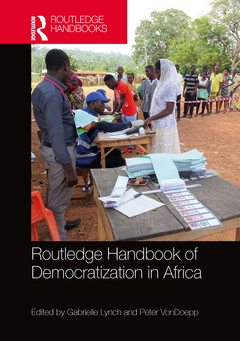Description
Routledge Handbook of Democratization in Africa
Coordinators: Lynch Gabrielle, VonDoepp Peter
Language: English
Subject for Routledge Handbook of Democratization in Africa:
Keywords
Young Man; Malawi Electoral Commission; John Magufuli; Ghana’s Fourth Republic; Co-ethnic Candidates; Constituency Development Funds; Vice Versa; Central African Republic; Ghanaian Voters; Electoral Commission; Civil Society; EMBs; Colonial Administration; John Mahama; Big Man Syndrome; Political Parties; Horizontal Accountability Mechanisms; Dissatisfied Democrats; Institutionalized Party Systems; Non-heterosexual; Central Government; Sexual Minority Rights; Electoral Violence; Women’s Legislative Representation; Horizontal Accountability
Publication date: 03-2021
· 17.4x24.6 cm · Paperback
Publication date: 07-2019
· 17.4x24.6 cm · Hardback
Description
/li>Contents
/li>Readership
/li>Biography
/li>
This volume explores the issues and debates surrounding the ongoing processes of democratization in sub-Saharan Africa, illuminating the central dynamics characterizing Africa?s democratic experiments, and considering the connections between democratization and economic, social, and cultural developments on the continent.
Reflecting the diverse and rich nature of this field of study, the Handbook of Democratization in Africa features more than thirty contributions structured into six thematic sections:
- The politics and paths of regime development
- Institutional dynamics
- Political mobilization and voting dynamics
- The politics of identity
- Social forces from below
- The consequences of democracy.
Chapters offer overviews of the key scholarship on particular topics, including central insights from the latest research, and provide suggestions for those interested in further inquiry. The material includes attention to broad cross-continental patterns, for example with respect to public opinion, political violence, or the role of different institutions and actors. It also includes rich case material, drawing on and highlighting the experiences of a diverse collection of countries.
Encouraging a comprehensive view of key concerns and enhancing understanding of particular issues, the Handbook of Democratization in Africa represents a critical resource for experts and students of African politics, democratization, and African studies.
Part 1: The politics and paths of regime development 1. Neopatrimonialism and democracy 2. Pathways to democracy 3. Post-conflict democratization and power-sharing 4. The impact of foreign aid 5. Natural resources Part 2: Institutional dynamics 6. Federalism and devolution 7. The struggle for presidential term limits 8. Executive power and horizontal development 9. The politics of legislative development 10. Judicial power 11. Militaries 12. Electoral administration Part 3: Political mobilization and voting dynamics 13. Voting behavior 14. Clientelism 15. Campaign strategies 16. Political parties and party systems 17. Opposition coalitions 18. The use of electoral violence Part 4: The politics of identity 19. Christianity and democracy 20. Islam and democracy 21. Gender politics 22. Ethnic politics 23. Generational dynamics and the politics of youth Part 5: Social forces from below 24. Public opinion and democratic legitimacy 25. Civil society 26. Digital media, networked spaces, and politics 27. Popular protest and accountability 28. Urban politics Part 6: The consequences of democracy 29. Economic growth and development 30. Corruption 31. Sexual minority rights 32. Citizenship
Gabrielle Lynch is Professor of Comparative Politics at the University of Warwick, UK.
Peter VonDoepp is Associate Professor of Political Science at the University of Vermont, USA.




